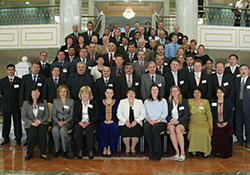Progress achieved with malaria elimination in the WHO European Region

WHO
Ashgabat, Turkmenistan
30 October – 1 November 2007
The meeting took place almost two years after the endorsement of the Tashkent Declaration by all malaria-affected countries in the WHO European Region. Its aims were:
- to report on achievements and to share experience with malaria elimination between countries and regions;
- to review existing methods of dealing with malaria and identify problems encountered in countries;
- to promote cross-border cooperation among countries and between the WHO European and Eastern Mediterranean regions;
- to streamline mechanisms for more effective partnership action at the interregional, subregional and country levels; and
- to stimulate the flow of additional resources to malaria elimination.
The following countries were represented: Afghanistan, Armenia, Azerbaijan, Georgia, the Islamic Republic of Iran, Kazakhstan, Kyrgyzstan, the Republic of Moldova, the Russian Federation, Tajikistan, Turkey, Turkmenistan and Uzbekistan. Participants also included staff from WHO headquarters, WHO/Europe and the WHO Regional Office for the Eastern Mediterranean; as well as representatives of the Global Fund to Fight AIDS, Tuberculosis and Malaria (GATFM – headquarters Azerbaijan, Georgia, Kyrgyzstan, Uzbekistan); the United Nations Development Programme (UNDP) Tajikistan; and experts from the Martsinovsky Institute of Medical Parasitology and Tropical Medicine, the Central Institute for Postgraduate Medical Training and the Vavilov Institute of General Genetics (Russian Federation); Doctors Without Borders Turkmenistan; Project HOPE Turkmenistan; and the Kenya Medical Research Institute (KEMRI), University of Oxford (United Kingdom).
The participants underlined the need to intensify partnership actions at all levels and urged partners to increase their financial assistance for malaria elimination.



